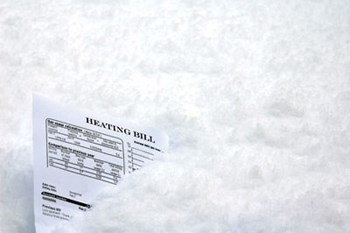
This winter, when the cold winds of winter whip down from Canada or Nor'easters swirl up the coast bringing tons of snow, condominium residents will head to that thermostat and crank up the heat. Unfortunately, each twist of the thermostat dial may put the chill on association budgets.
With both oil and natural gas prices skyrocketing over the course of the past year and alternative energy sources still lagging behind in cost effectiveness, the price of keeping residents toasty is becoming uncomfortably high. And while outrageous oil prices may get us steamed, condominium boards and managers are still faced with the challenge of keeping their residents comfortable when the temperatures drop. To avoid leaving residents out in the cold, here is what some condominiums across New England are doing:
Gas It Up
When increasingly tight budgets meet with steadily increasing oil prices, something has to give. One option many condominium associations are actively considering is switching from oil-fired furnaces to natural gas ones. Although this requires a significant initial capital outlay, many condominium boards are tempted by the potential for savings that are just as significant.
According to a published report in August, heating oil had risen from $2.59 to nearly $5. And although natural gas had gone up 15% accordingto the same report, it is still a relative bargain.
For Kevin Kelliher of The Lundgren Management Group, a Boston property management company, switching to natural gas from oil at his Lincoln Halls Condominiums in Boston would bring the 2009 heating budget back down to 2007 prices. With National Grid, a New England natural gas and electric company, contributing two new energy-efficient steam boilers, he anticipates the payback on the entire project to be two to two-and-a-half years.
In addition to saving money, natural gas offers several benefits. According to the Massachusetts Department of Energy Resources (DOER), “natural gas accounts for 24 percent of our [national] total energy use.” Natural gas is seen as a cleaner, more efficient fuel than oil, releasing effectively no particulates into the air and almost no odor or soot.
It also has more uses than oil—natural gas can be used to run clothes dryers, stoves, BBQ grills, and pool heaters. It can even be used to heat liquid for radiant heat coils underneath outdoor walkways, keeping those walkways clear of ice and snow.
And while oil is stored on the premises, requiring large tanks and frequent refills during cold winters, natural gas can often be delivered via a pipeline, thus eliminating the storage tanks and need to be concerned about refills. Perhaps the most compelling reason is that most of our natural gas is produced domestically, without the foreign entanglements of oil. As Kelliher observes, the majority of condo boards are investigating the switch to natural gas because “people are just sick of our dependence on foreign oil.”
Upgrade to Save
One clear benefit associated with switching to natural gas can be obtained without even switching over. For his Lincoln Halls property, Kelliher noted that the current equipment had passed the 30-year mark of a 30- to 50-yearrated lifespan. So, even though the boilers were a bit young for replacement, the sheer increase in efficiency made it worth it to rotate them out. He estimates that getting rid of equipment older than twenty years can gain a five to ten percent efficiency whether you switch to natural gas or not. The new units may also qualify for rebates or tax incentives. Upgrading and examining existing ductwork can also result in significant energy savings.
Bob Kravets, president of Realty Corporation of Massachusetts in Chestnut Hill, cites three steps as being far more important for keeping heating costs in check than conversion: maintain, update, and negotiate. Kravets stresses the importance of keeping all heating and cooling units well-maintained. The Massachusetts Department of Energy Resources echoes this advice, explaining that “a dirty or clogged filter will demand more energy and slow the heating process.”
Every source consulted for this article agreed on the importance of routine and seasonal maintenance, no matter what type of fuel. Experts strongly suggest cleaning and inspectingthe furnace and/or boiler, cleaning and checking ductwork for leaks, and insuring that nothing is blocking the radiators. Additional maintenance includes insulating pipes, caulking around windows and doors to cut down on drafts, and installing programmable thermostats.
As explained above, installing newer furnaces and boilers can result in immediate cost decreases. When updating equipment, the MassachusettsDepartment of Energy Resources advises investigating higher efficiency models (such as the ones certified by the Energy Star program). These units can provide the same results as traditional units but use a fraction of the energy.
Negotiating, the third prong in Kravets’ approach, entails working with the utilities to insure the best contract, whether it is a fixed, variable, or cap price. Some brokers suggest that period between Labor Day and Columbus Day is the most common time for renewing or negotiating contracts. However, the most important factor seems to be having solid historical data on energy usage. That enables property managers to know exactly what they need and what type of business they are offering.
The Cost Analysis
Both Kelliher and Kravets identify their long relationship with the properties they manage as key. For Kelliher, it allowed him to present a full cost analysis to the trustees of his Lincoln Halls property based on the solid data of past years. He can look at a condominium's past usage and calculate where and when the best savings will occur, given assumptions about the relative price of oil and natural gas. There is also a measure of trust that helps when presenting options to the board.
For Kravets, his history means that he is confident that the properties under his management have already done most of what they can do in terms of energy efficiency. He also uses the longstanding relationships to help negotiate favorable contracts with utilitycompanies. He cites one example of a property that bought into a fixed five-year contract last year — just before energy costs skyrocketed.
And Kravets doesn't think prices will come down anytime soon. Although Kravets believes that the 2009 year budget process will force people to come to grips with high energy prices, he does not necessarily advocate switching from oil to natural gas or the other way around. There is just too much volatility in the markets to decisively go one way or the other, he advises.
Of course, long-term energy savings, a lower impact on the environment, and a “greener” public profile are not hard sells for condominium associations, but the money has to come from somewhere. In Kelliher’s Lincoln Halls upgrade, one quarter of the money was fronted by the association itself out of its reserves. The additionalcost of the project was passed on to the owners with the approval of the board. Even with the additional costs, Kelliher says the response has been “extremely positive.” Kelliher has also seen projects funded through low-interest loans and partial grants.
The old adage proves doubly true here. While many are loathe to imagine a New England winter landscape while trees still have some of their leaves, it is significantly easier to do the duct work and boiler maintenance while the weather is warmer than it is in midwinter.
In addition to lower costs and easier work, many heating professionals are understandably busy during the winter months and therefore may be less responsive. A third reason to act now is that researching the many options take time. While there are things that can be done now to improve heating efficiency for the coming winter, major upgrades or conversions may have to be planned for the following summer. The predictions for a strong winter and no real relief from heating costs will ensure that many people across New England will be investigating new options. Starting the research now may put you ahead of the curve.
Robert Todd Felton is a freelance writer with New England Condominium magazine.






Leave a Comment